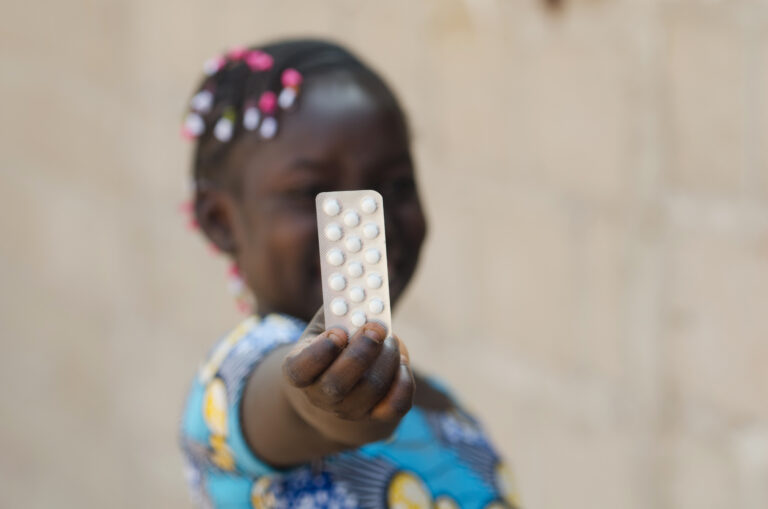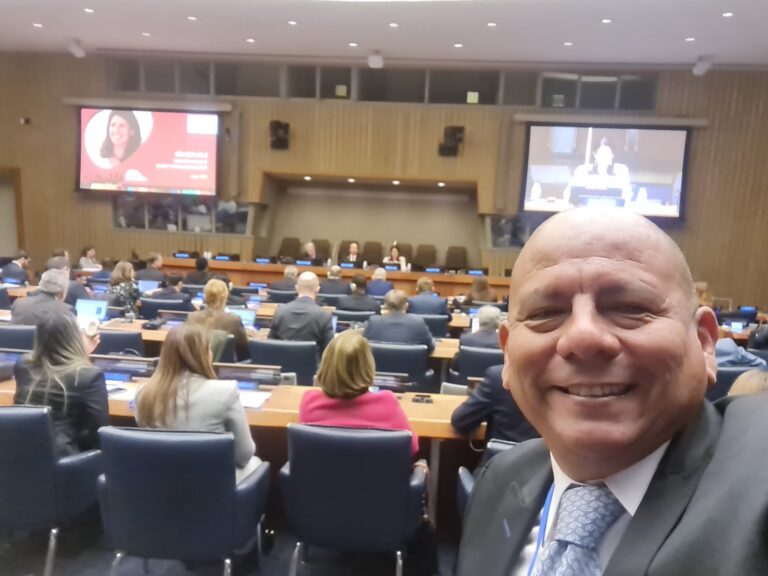OC health precautions reduced in Francophone Africa
“Improved access to oral contraceptives (OCs)” for women in French-speaking African nations resulted from three key conferences in Senegal, Niger and Togo. Previous guidelines for OCs in many of these nations called for laboratory tests that included Pap smears, blood tests and urine analysis.
The health requirements were changed as a result of research supported by Family Health International (FHI), the University of Dakar, the International Science and Technology Institute (ISTI), and the Family Health and Population Project in Senegal. Funding is provided by the U.S. Agency for International Development.
The nine-month study, titled the “Dakar Resolution,” resulted in recommendations to discontinue “systematic testing” prior to OC use and to “improve clinic screening procedures” for contraceptives. The resolution was endorsed by “family planning experts” from Senegal, Benin, Burkina Faso, Cote d’Ivoire, Niger, Morocco and Togo.
The Senegal Minister of Health Development added an official approval to the resolution (Los Angeles Times, 9 February 1992).
Female infanticide in India
U.S. researchers have reported that 72 per cent of all deaths of infant girls in a rural southern India region were the result of infanticide. The researchers said that one in every 10 female births in rural areas of Tamil Nadu state ended in such murders. They suspect that a much higher percentage of infanticides actually occurred. Male children are considered to have higher value to families because they are better able to support parents in their old age.
The study is seen as shedding light on reports that the Indian subcontinent and China have as many as 60 million fewer women than would normally be expected. The reported shortage was based on analysis of expected birth ratios and survival in childhood as compared to male/female ratios in other areas of the world (see PRI Review, Sept/Oct 1991, 6).
There are approximately 105 women for every 100 men in the United States and Europe. In Africa and Latin America, where childhood mortality is higher for females, the numbers of men and women are about equal. But there are only about 94 women for every 100 men in China and the Indian subcontinent, (Thomas H. Maugh II, “Researchers find widespread infanticide of girls in India,” Los Angeles Times, Sunday Home Edition, 9 February 1992).
AIDS education in family life education curriculum
After years of dispute with the Roman Catholic Church, in charge of most of the secondary schools in Rwanda, the National Population Office (ONAPO) developed and introduced a sex education programme in Butare in 1988. It has been severely attacked by the Rwandan Catholic School Authority in Butare.
Rwanda is a predominantly Catholic country, and the Catholic bishops made it very clear that they would not allow family planning services in Catholic Health facilities. According to the International Planned Parenthood Federation, “This irresponsible attitude had a substantial negative impact on the programme.”
ONAPO has been active in desensitizing Rwandans in order to facilitate the introduction of contraceptives in health facilities since 1981. In two southern provinces, Butare and Gilrongoro, the German Agency for Technical Cooperation (GTZ) has been assisting with technical and financial support in this effort. GTZ working with ONAPO provided “information, education, communication” materials as well as wooden penis models for demonstration of condom usage. Determined to increase contraceptive usage in the area, 17,000 ‘Abakangurambaga,’ i.e., village volunteers, are to be used by ONAPO to promote contraceptive usage with the assistance of Columbia University, New York City (IPPF Medical Bulletin, Vol. 26, No. 3. June 1992).
A Pandora’s box of chemical pollutants
Male workers exposed to chemicals such as alkylmercury, anaesthetic gases, and synthetic estrogens risk developing sperm abnormalities, hyperestrogenism, impotence, infertility and high miscarriage rates in their wives. Female workers risk alterations in the menstrual cycle, pregnancy complications, and infertility.
Chemicals emitted as pollutants may also damage reproductive processes in women who live near industrial plants. A study conducted in Bulgaria by Dr. Sonia Tabacova examined how pregnancy is influenced in women living in polluted industrial areas. Two groups of women in their last trimester of pregnancy were followed up. One group lives near a metal smelting plant that emits lead and the second group near a petrochemical plant that releases hydrocarbons and organic solvents. Results of the study indicate significantly higher levels of lead in the blood, and increased excretion of the metabolic products of organic solvents in pathological pregnancies as compared to the normal ones. Threatened spontaneous abortion, toxaemia and anaemia were associated with higher lead exposures in areas of smelters. Styrene exposure in a petrochemical industrial area was associated mainly with late toxaemia and nephropathy. The study underlines the concern that complications of pregnancy could be induced by environmental agents at levels lower than those resulting in pregnancy loss or preterm birth (Progress in Human Reproduction Research, World Health Organization, No. 20 1991, 7).
Reducing the number of Brazilians — and Mexicans — and Colombians
The local paper mill in Telemaco Borba, Brazil, a city of 65,000 began a family-planning program in 1977 for its employees. The number of children born to employees was successfully reduced from 5 to 2.2 per couple. Today the city government is helping the Klabin Company expand the population control program beyond the mill to the population at large.
“At the beginning, the Roman Catholic Church was radically against this. But today, seeing the relevance and social usefulness of it, the priests and nuns are our allies,” says Virgilio Castello Branco, the Klabin company’s administrative director.
Questioned in a telephone interview, the local Catholic bishop, Dom Murilo Sebastiao Ramos Krieger said: “It’s impossible to light these things in every corner of the country. The city serves everyone; the church serves its own. It gives a general orientation [on birth-control policy but] …the method of Christ was to show the ideal, not to use coercion.”
“The increasing acceptance of contraception and family planning by Catholics will contribute significantly to global efforts to reduce population-growth rates,” says a senior United Nations population expert, who asked not to be named.
The Population Reference Bureau, a Washington, D.C.-based group founded for eugenics purposes, claims that in Mexico and Colombia, aggressive government-backed programs have gone largely unopposed by local church leaders and have contributed to dramatic reductions in the average number of children per family. (Julia Michaels, “Brazilians Face Population Dilemma” The Christian Science Monitor, 3 July 1992, 13).
U.S. mixed record on population control
The U.S. record on international population efforts is described as “mixed in recent years.” The U.S. signed the 1989 “Amsterdam Declaration,” which called for making contraceptives available to 209 million more couples and set a goal of $9 billion in annual spending for population-related activities by the year 2000.
The Reagan administration in 1986 halted all U.S. contributions to the U.N. Population Fund and the International Planned Parenthood Federation on the grounds that the organizations encouraged abortion. Although as a congressman and ambassador to the UN he was a supporter of family planning, President Bush has continued the ‘no-funding’ policy.
If the United States had followed the Amsterdam policies, the U.S. would be currently spending $650 million a year on contraception and abortion efforts around the world as part of its foreign aid program. However, current spending is $250 million as it was last year. The House foreign-aid bill for 1993 raises that to $330 million, but it also includes what has been described as “veto bait,” that is, $20 million for the UN Population Fund. The Senate is expected to vote on a similar bill this fall (Brad Knickerbocker, “Rio Reminder: Population Is Not an Isolated Issue”).
Anti-pregnancy vaccine to be used in India
A vaccine for women has been successfully tested and is ready for the market, an Indian researcher said during a medical congress in Rome. Gurseran Talwar, a professor at New Delhi’s Immunology Institute, said the vaccine would be used on a large scale in his country beginning next year.
The vaccine was created with funds supplied by the Indian government and the U.S. Rockefeller Foundation. It causes the body to develop antibodies that block the normal production of the hormone involved in conception. Talwar said a vaccination consisted of three injections and remained effective for six to eight months (Rome, 1 Sept. 1992, DPA).
U.N. Commission on Sustainable Development
One achievement in Rio that could keep the “memory of the Earth Summit very much alive,” is the creation of the U.N. Commission on Sustainable Development. It is the task of this body to “oversee” promises made in Rio, “shining the spotlight on countries that renege.” The commission is be composed of “high-level” government representatives with the power to make decisions. The new commission will use the “powers of publicity and peer pressure” to implement Agenda 21 and other Rio agreements.
The “threatened use of censure” is expected to saturate the commission’s dealings with member states. U.N. members will update the commission on their progress in putting Agenda 21 into practice and the problems they may be facing in enforcing Agenda 21 programs. Industrial countries will be monitored to make sure they follow through on their pledges to provide financial and technical assistance to poorer nations. The Commission will also review progress on implementing environmental treaties, such as those completed in Rio on climate change and on the loss of biological diversity.
The Commission is “mandated” to provide high-level coordination for U.N. agencies and programs — including the Development Program, the Environment Program, the Food and Agriculture Organization, the Population Fund, and the Industrial Development Organization — which conduct programs that bear on this issue. All “relevant bodies,” including the International Monetary Fund (IMF) and the World Bank, are to report to the new commission on what they are doing to integrate Agenda 21 into their programs (Hilary F. French, “Hidden Success at Rio,” World Watch, Vol. 5, No. 5, Sept/Oct 1992, 7).
Fewer Vietnamese than ever in Vietnam
The fertility rate (average number of children per woman) in Vietnam, since the end of the Indochina War, dropped from six in the early 1970s to four in the late ’80s. This was a key finding in a study from the 1983 Demographic and Health Survey of Vietnam and the 1989 Five Percent Population Census Sample, the first reliable statistics on Vietnamese fertility patterns and the government’s family planning program. The study was contained in an article titled “Fertility and Family Planning in Vietnam,” published in the USAID-funded Population Council’s journal, Studies in Family Planning.
The team of authors, headed by James Allman, also found that: 90 percent of Vietnamese women have heard of modern contraceptive methods: 37 percent of married women were using one of them in 1988; the IUD is the most widely available and most popular method used: abortion is widespread (International Dateline, Populations Communications International, July/August 1992).
AIDS testing required in Israel
Every Jewish couple outside of Israel must undergo AIDS testing before marriage, ruled Sephardi Chief Rabbi Mordechai Eliahu. He also said marriage registrars must not allow couples to marry unless they have been tested. While noting that such regulations need not be issued in Israel yet, the Rabbi said that if the disease “increases to worrisome proportional” there, the Chief Rabbinate could mandate AIDS testing before marriage. The ruling came in response to a question from the rabbi of a Diaspora [anywhere outside Israel] community wondering whether couples could be required to be tested for AIDS before marriage. Dr. Shlome Ma’ayan, director of the AIDS unit at Jerusalem’s Hadassah Hospital, said that the ruling is “reasonable” and the value of such testing is “indisputable,” but added that he didn’t think “it was necessary to make such testing compulsory.” Dr. Ma’ayan also stressed that testing will not prevent the disease, and that education toward safe sex must be increased (International Dateline, July/August 1992).
USAID-funded Population Council — calls for “safe abortion” in Eastern Europe
Referring to discussions at a 1990 conference in Georgia of the former Soviet Union, Population Council officials backed the European meeting’s Tbilisi Declaration: “to recognize that unwanted pregnancy and unsafe abortion is a major health problem and to caution that even the best family planning programs need to be supported by access to ‘safe abortion services.’”
Council officials remarked that abortions “have declined most rapidly in countries where legal terminations are part of a comprehensive family planning program.” The promotion of a “full range” of contraceptives is expected to guarantee “responsible sexual behavior” (“Abortion Digest,” Family Planning World, Vol. 2, No. 5, September/October, 1992).
USAID grant of $40 million to CONRAD
The Contraceptive Research and Development Program (CONRAD) has been extended for another five years with funding of $40 million from USAID. CONRAD engages in research, clinical trials, and collaboration with pharmaceutical and biotechnical companies in the development of contraceptives for use in Third World countries. CONRAD was engaged in trials of the female condom, contraceptive injections for men and “suitable” contraceptives to prolong natural infertility in nursing mothers (Ibid).
Feature: USAID Nigeria Project Fails
When USAID’s Nigerian Family Health Services Project (FHS) got underway in 1988, the fertility level in Nigeria was “roughly comparable” to the present rate of six children for each woman. Resistance to the project has been consistent and successful.
The Family Health Services project involved live prime USAID contractors and 10 major subcontractors: all were experienced and “accustomed to running their own show.” The five prime contractors were the Pathfinder Fund, Family Planning International Assistance (FPIA), the African American Institute and two Johns Hopkins University groups: Population Communication Services (PCS) and the Institute For International Programs (IIP).
Subcontractors included: the Center for Development and Population Activities (CEDPA): the Program for Appropriate Technology in Health (PATH), Africare, Management Sciences for Health, John Snow Inc., and Population Services International.
The project was budgeted at $67 million (USAID) with an additional $33 million from the government of Nigeria. A new $120 million project (with $90 million in USAID money) is set to begin sometime in 1993. USAID officials say that the new project, which hasn’t been finalized yet, will probably involve fewer prime contractors and focus more on service delivery and private sector involvement. Administrators are also hoping that the “haunting” 3.5 percent contraceptive prevalence figure will be replaced by a 12 percent contraceptive prevalence rate by the time the new project begins.
When asked how many children they would like to have, 60 percent of Nigerian women surveyed said that, “It is up to God.” The lack of knowledge about contraception has made family planning “no easy task for FHS.” Only 40 percent of Nigerian women can name a modern birth control method and only 30 percent know where to get it.
FHS found an “important governmental ally” in Nigerian Minister of Health Dr. Olikoye Ransome-Kuti but the project could lose federal cooperation when the military leaders turn power over to the civilian government at the end of the year. The new government is expected to shift population control responsibilities to the 589 local governments, increasing “the bureaucratic complexities” of manipulating the already decentralized 31 Nigerian states.
The nation’s religions and culture are opposed to the contraceptive/abortion strategies of the USAID contractors. The north of Nigeria is almost exclusively Muslim and does not approve of pelvic exams or contraceptives, such as IUDs, that are considered bodily invasions of the women. The southern Catholic and Christian groups also have strong moral objections to population control methodologies.
In the past, Nigerian officials have not hesitated to openly state their distrust of Americans, accusing U.S. agencies of trying to “control the size of African nations and decreasing the number of blacks in the world.”
“People try to simplify Nigeria,” said John McWilliam, the FHS project administrator. “Believe me, there’s nothing simple about this place” (Ibid).










